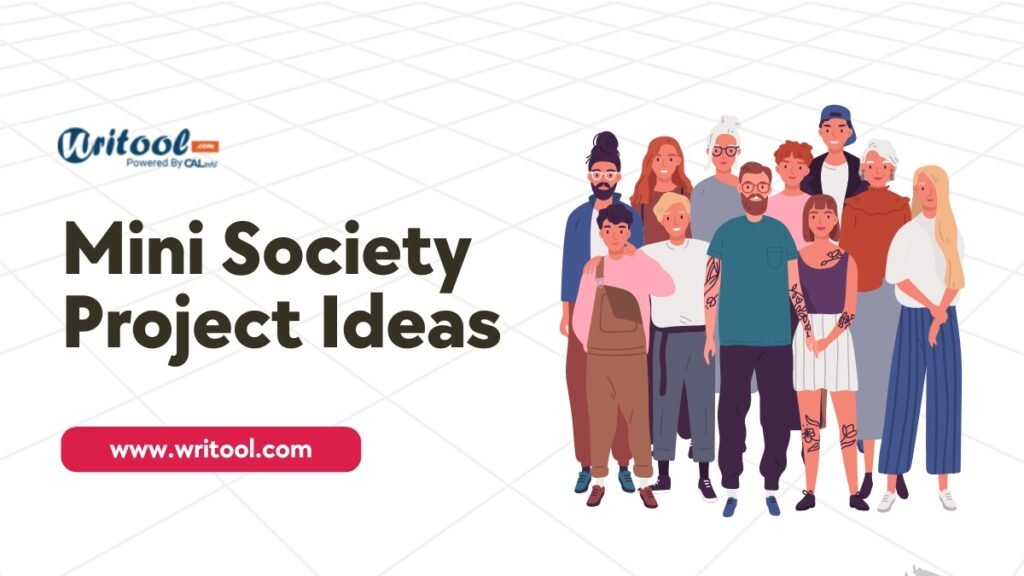Discover exciting mini society project ideas that spark creativity, foster teamwork, and make a positive impact. From starting a business to community service initiatives, explore fun projects for all ages!
Hey there! Ever wanted to try something really cool with your friends or classmates? Well, that’s where mini society projects come in! They’re like these fun projects where you get to try out different ideas and make a real difference.
In this article, we’re gonna check out some awesome mini society project ideas that you can totally get into.
So, get ready to have some fun and make a difference with mini society projects. Let’s jump right in and see what adventures await!
Benefits of Mini Society Projects
Here’s why they’re so valuable:
Practical Learning
Mini society projects turn classroom lessons into real-life experiences. Students run stores, create governments, or manage farms, applying what they’ve learned in math, economics, civics, or agriculture.
Skill Development
These projects teach collaboration, communication, and problem-solving. Students work together, share ideas, and tackle challenges, building important life skills.
Creativity
Designing currency, making laws, or crafting products sparks creativity and independent thinking.
Social Studies Introduction
Mini societies introduce economics, government, and resource management in a fun and safe environment.
Engagement
Mini societies are fun! They break from routine, letting students learn through play and enjoy the learning process.
Mini society projects offer practical, engaging learning experiences that foster essential skills and creativity in students.
Mini Society Project Ideas
Check out Mini Society project ideas:-
Education and Learning
- Create a school newspaper.
- Start a peer tutoring program.
- Organize a science fair.
- Host language exchange sessions.
- Conduct a career fair.
- Implement a recycling program.
- Start a coding club.
- Organize a debate club.
- Establish a library system.
- Start a mentoring program.
Community Service and Social Welfare
- Volunteer at soup kitchens.
- Organize a fundraising event.
- Create care packages for the elderly.
- Start a community garden.
- Organize a neighborhood clean-up.
- Host workshops on financial literacy.
- Start a youth mentorship program.
- Organize a blood donation drive.
- Host a charity auction.
- Create awareness campaigns on mental health.
Arts and Culture
- Organize a talent show.
- Start a community choir.
- Host art workshops.
- Organize a cultural festival.
- Create a mural project.
- Start a community theater group.
- Host a film festival.
- Organize a photography contest.
- Start a creative writing club.
- Host a dance workshop.
Health and Wellness
- Organize a fitness challenge.
- Start a nutrition education program.
- Host yoga or meditation sessions.
- Create a mental health support group.
- Organize a sports tournament.
- Host first aid and CPR training.
- Start a walking or running club.
- Organize a healthy cooking class.
- Host a health fair.
- Create a community-wide wellness initiative.
Technology and Innovation
- Organize a hackathon.
- Start a robotics club.
- Host workshops on 3D printing.
- Create a technology repair program.
- Start a STEM outreach program.
- Host a virtual reality gaming competition.
- Organize a tech showcase.
- Create a coding curriculum.
- Host a tech talk series.
- Start a computer programming club.
Business and Entrepreneurship
- Start a student-run business.
- Organize a business pitch competition.
- Host workshops on financial planning.
- Create a small business incubator.
- Start a stock market simulation game.
- Organize a networking event.
- Host a career development workshop.
- Start a community marketplace.
- Create a business mentorship program.
- Organize a small business expo.
Environment and Sustainability
- Start a community composting program.
- Organize a tree planting initiative.
- Host workshops on sustainable living.
- Create an energy conservation challenge.
- Organize a beach or river cleanup.
- Start a zero-waste initiative.
- Host a workshop on urban gardening.
- Organize a clothing swap event.
- Start a community bike-sharing program.
- Host a documentary screening on environmental issues.
Civic Engagement and Government
- Organize a mock election.
- Start a youth council.
- Host a town hall meeting.
- Create a civics education program.
- Organize a voter registration drive.
- Start a community advocacy group.
- Host a meet-and-greet with officials.
- Organize a community service day.
- Create a platform for resident input.
- Host a workshop on running for office.
Media and Communication
- Start a community radio station.
- Organize a journalism workshop.
- Host a photography exhibition.
- Create a community newsletter.
- Organize a social media campaign.
- Start a film club.
- Host a storytelling event.
- Create a video series.
- Organize a writing contest.
- Start a citizen journalism initiative.
Sports and Recreation
- Organize a sports league.
- Start a recreational sports team.
- Host a sports tournament.
- Create a fitness challenge.
- Organize a hiking or camping trip.
- Start a community sports facility.
- Host a sports clinic.
- Organize a sports equipment drive.
- Start a community bike ride.
- Host a sports day event.
Food and Nutrition
- Organize a cooking competition.
- Start a community garden.
- Host a nutrition workshop.
- Create a healthy eating challenge.
- Organize a farmers market.
- Start a community cookbook project.
- Host a food preservation workshop.
- Create a food pantry.
- Organize a cultural food festival.
- Start a community cooking class.
Travel and Tourism
- Organize a cultural exchange program.
- Start a tourism ambassador program.
- Host a heritage walk.
- Create a map of local attractions.
- Organize a food tour.
- Start a community bike tour.
- Host a photography contest.
- Organize a scavenger hunt.
- Start a travel club.
- Host a cultural immersion event.
Science and Technology
- Organize a robotics competition.
- Start a science club.
- Host a technology showcase.
- Create a STEM education program.
- Organize a science fair.
- Start a coding boot camp.
- Host workshops on renewable energy.
- Organize a DIY electronics workshop.
- Start a computer programming club.
- Host a speaker series with scientists.
Arts and Crafts
- Organize an art exhibition.
- Start a craft club.
- Host a pottery workshop.
- Create a community mural.
- Organize a DIY craft fair.
- Start a knitting or crocheting club.
- Host a painting party.
- Organize a scrapbooking workshop.
- Start a jewelry making club.
- Host a woodworking class.
Music and Performance
- Organize a talent show.
- Start a community choir.
- Host a karaoke night.
- Create a music education program.
- Organize a concert series.
- Start a community band or orchestra.
- Host a songwriting workshop.
- Organize a dance performance.
- Start a music therapy program.
- Host an open mic night.
Fitness and Wellness
- Organize a fitness challenge.
- Start a walking or running club.
- Host yoga or meditation sessions.
- Create a wellness program.
- Organize a sports tournament.
- Start a community garden.
- Host a healthy cooking class.
- Organize a Zumba or dance class.
- Start a mindfulness workshop.
- Host a wellness fair.
Environmental Sustainability
- Start a composting program.
- Organize a tree planting event.
- Host workshops on composting.
- Create a community clean-up day.
- Organize a campaign to reduce plastic.
- Start a zero-waste initiative.
- Host a workshop on urban gardening.
- Organize a clothing swap.
- Start a bike sharing program.
- Host a seminar on sustainable living.
Education and Literacy
- Organize a book drive.
- Start a literacy program.
- Host a storytelling event.
- Create a tutoring program.
- Organize a spelling bee.
- Start a book club.
- Host a writing workshop.
- Organize a career day.
- Start a homework help hotline.
- Host a poetry slam.
Community Development
- Start a neighborhood watch program.
- Organize a community clean-up.
- Host a town hall meeting.
- Create a community newsletter.
- Organize a block party.
- Start a community garden.
- Host a cultural exchange event.
- Organize a welcome committee.
- Start a community library.
- Host a volunteer appreciation event.
Health and Wellness
- Organize a fitness challenge.
- Start a walking or running club.
- Host a healthy cooking class.
- Create a stress reduction workshop.
- Organize a sports tournament.
- Start a community garden.
- Host a wellness fair.
- Organize a yoga or meditation class.
- Start a support group.
- Host a seminar on nutrition.
Mini Society Project Ideas Based on Grades
Check out mini society project ideas based on grades:-
Lower Grades (Elementary School)
- Classroom Store: Sell student-made crafts with play money.
- Community Jobs: Explore roles like doctor or firefighter through research or role-play.
- Cultural Showcase: Exhibit crafts and food from different cultures.
Middle Grades
- Historical Simulation: Act out scenarios from a chosen historical period.
- Sustainable City Design: Design a model city with renewable energy and green spaces.
- Mock Trial: Simulate a trial with assigned roles.
Higher Grades (High School)
- Global Issues Simulation: Research and propose solutions to global issues.
- Stock Market Challenge: Invest and track portfolios in a simulated stock market.
- Non-Profit Project: Raise awareness and funds for a chosen social issue.
These projects cater to different grade levels while keeping activities straightforward and engaging.
Mini Society Project Ideas Based on Levels
Check out mini society project ideas based on levels:-
Beginner Level
Classroom Olympics
- Description: Organize mini-games representing different jobs or skills. Award points for participation.
- Learning Focus: Basic understanding of social roles, teamwork.
Community Helpers Fair
- Description: Invite local professionals to showcase their roles. Students create presentations about different jobs.
- Learning Focus: Exploring various professions, communication skills.
Mini-Market
- Description: Students create shops with handmade crafts. Use pretend currency for buying and selling.
- Learning Focus: Basic economics, entrepreneurship, social interaction.
Intermediate Level
Lost Colony Simulation
- Description: Create a society with different roles facing challenges. Work together to survive.
- Learning Focus: Social dynamics, problem-solving, collaboration.
Disaster Relief Simulation
- Description: Respond to a simulated disaster. Allocate resources, plan rescue efforts, communicate effectively.
- Learning Focus: Crisis management, resource allocation, communication skills.
Mythical Kingdom Role-Play
- Description: Design a fantasy kingdom with social classes. Role-play scenarios exploring interactions and conflicts.
- Learning Focus: Social dynamics, conflict resolution, creative thinking.
Advanced Level
Sustainable City Design Challenge
- Description: Design a model city focusing on renewable energy, resource management, and social equity.
- Learning Focus: Urban planning, sustainability, critical thinking.
Global Issues Model Congress
- Description: Research a global issue, simulate a congress session. Represent countries, propose solutions.
- Learning Focus: Global awareness, diplomacy, research skills.
Mock Trial with Historical Context
- Description: Research a historical trial, act it out considering historical biases. Reflect on perspectives.
- Learning Focus: Legal reasoning, historical analysis, critical thinking.
Mini Society Project Ideas for College Students
Check out mini society project ideas for college students:-
Socially Conscious Projects
Sustainable Food Cooperative
- Simulate a grocery store focusing on local, organic produce. Manage finances and responsible sourcing.
- Learning Focus: Sustainable business, ethical sourcing.
Global Health Challenge
- Research a disease in a developing country. Develop a response plan as healthcare professionals and NGOs.
- Learning Focus: Global health, collaborative problem-solving.
Ethical Tech Development
- Design a social media platform prioritizing user privacy. Consider ethical implications.
- Learning Focus: Technology ethics, social responsibility.
Project-Based Learning
Smart Campus Initiative
- Propose tech solutions for campus sustainability.
- Learning Focus: Sustainable technology, data analysis.
Disaster Relief Innovation Challenge
- Develop a disaster relief prototype.
- Learning Focus: Innovation, problem-solving.
Microfinance Simulation
- Simulate a microfinance organization.
- Learning Focus: Financial management, social entrepreneurship.
Creative and Engaging Projects
College Film Festival
- Organize a film festival showcasing student short films.
- Learning Focus: Filmmaking, event management.
Themed Historical Debate
- Debate historical events from different perspectives.
- Learning Focus: Historical analysis, critical thinking.
Interdisciplinary Art Exhibition
- Combine art forms to explore a theme.
- Learning Focus: Collaboration, artistic expression.
Remember
- Encourage collaboration and leadership.
- Use real-world data and research.
- Reflect on learning outcomes.
How to Implement a Mini Society Project?
Check out the best tips to implement a mini society project:-
Define Goals & Objectives
- Determine what students should learn (e.g., teamwork, economics).
- Adjust complexity based on age and abilities.
Brainstorm & Choose a Theme
- Consider student interests and learning goals.
- Themes can include historical periods, global issues, or movie studios.
Establish Framework
- Decide on structure (classroom-based, simulation).
- Set duration and roles/responsibilities.
Research and Planning
- Conduct research based on the theme.
- Collaborate to develop society’s structure and rules.
Implementation
- Plan activities (crafts, city design, role-playing).
- Manage resources (pretend currency, negotiation).
Documentation and Reflection
- Document progress with photos, videos, or journals.
- Hold reflection sessions to discuss learning and challenges.
By following these steps, you can create an engaging mini society project that enhances learning and collaboration.
Challenges and Solutions With Mini Society Project
Check out the challenges and solutions with mini society project:-
Challenges
- Lack of Engagement: Students might lose interest if the project is too complex.
- Conflict Resolution: Disagreements can arise, especially over resources.
- Unrealistic Expectations: Understanding real-world complexities can be tough.
- Time Constraints: Limited project duration may hinder deep exploration.
Solutions
- Student Choice & Adaptation: Let students choose roles and adjust complexity.
- Clear Rules & Conflict Resolution: Set communication rules and practice resolving conflicts.
- Debrief & Reflect: Discuss unrealistic expectations and real-world parallels.
- Focus on Key Concepts: Prioritize essential learning objectives.
Additional Tips
- Use Technology: Online tools aid research and communication.
- Invite Speakers: Professionals share real-world experiences.
- Vary Assessment: Use presentations, journals, and group projects for evaluation.
Addressing these challenges and solutions helps create a rewarding mini society project that fosters critical thinking and collaboration.
Importance of Mini Society Project Ideas
Importance of Mini Society Projects:
Hands-on Learning
- Turns abstract concepts into real experiences.
- Helps understand complex issues like social structures and resource management.
Essential Skills Development
- Builds collaboration, communication, and critical thinking.
- Enhances negotiation, decision-making, and leadership.
Creativity and Problem-Solving
- Encourages creative thinking and solution development.
- Students design solutions and strategies within the project.
Social Awareness and Empathy
- Helps understand different perspectives and social dynamics.
- Fosters empathy and understanding of others’ experiences.
Engagement and Retention
- Makes learning enjoyable and memorable.
- Increases retention through active participation.
Real-World Preparation
- Allows experimentation with social structures and decision-making.
- Prepares students to be responsible citizens and informed individuals.
Conclusion
In summary, mini society projects are like educational adventures, where students dive into interactive simulations and role-playing games. They not only help understand tough stuff like how communities work but also build teamwork and problem-solving skills.
With their fun and hands-on approach, these projects make learning feel more like a game and prepare students for the real world ahead. So, let’s dive in and start exploring!


